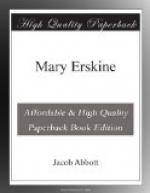In respect to the children’s part of all the property, they were not, themselves, to have the care of it, but some person was to be appointed to be their guardian. This guardian was to have the care of all their share of the property, until they were of age, when it was to be paid over into their hands.
If, however, the husband, before his death, was disposed to do so, he might make a will, and give all the property to whomsoever he pleased. If he decided, as Albert had done, to give it all to his wife, then it would come wholly under her control, at once. She would be under no obligation to keep any separate account of the children’s share, but might expend it all herself, or if she were so inclined, she might keep it safely, and perhaps add to it by the proceeds of her own industry, and then, when the children should grow up, she might give them as much as her maternal affection should dictate.
In order that the property of men who die, should be disposed of properly, according to law, or according to the will, if any will be made, it is required that soon after the death of any person takes place, the state of the case should be reported at a certain public office, instituted to attend to this business. There is such an office in every county in the New England states. It is called the Probate office. The officer, who has this business in charge, is called the Judge of Probate. There is a similar system in force, in all the other states of the Union, though the officers are sometimes called by different names from those which they receive in New England.
Now, while Albert was lying sick upon his bed, he was occupied a great deal of the time, while they thought that he was asleep, in thinking what was to become of his wife and children in case he should die. He knew very well that in case he died without making any will, his property must be divided, under the direction of the Judge of Probate, and one part of it be kept for the children, while Mary Erskine would have the control only of the other part. This is a very excellent arrangement in all ordinary cases, so that the law, in itself, is a very good law. There are, however, some cases, which are exceptions, and Albert thought that Mary Erskine’s case was one. It was owing, in a great measure, to her prudence and economy, to her efficient industry, and to her contented and happy disposition, that he had been able to acquire any property, instead of spending all that he earned, like Mr. Gordon, as fast as he earned it. Then, besides, he knew that Mary Erskine would act as conscientiously and faithfully for the benefit of the children, if the property was all her own, as she would if a part of it was theirs, and only held by herself, for safe keeping, as their guardian. Whereas, if this last arrangement went into effect, he feared that it would make her great trouble to keep the accounts, as she could not write, not even to sign her name. He determined, therefore, to make a will, and give all his property, of every kind, absolutely to her. This he did, in the manner described in the last chapter.




